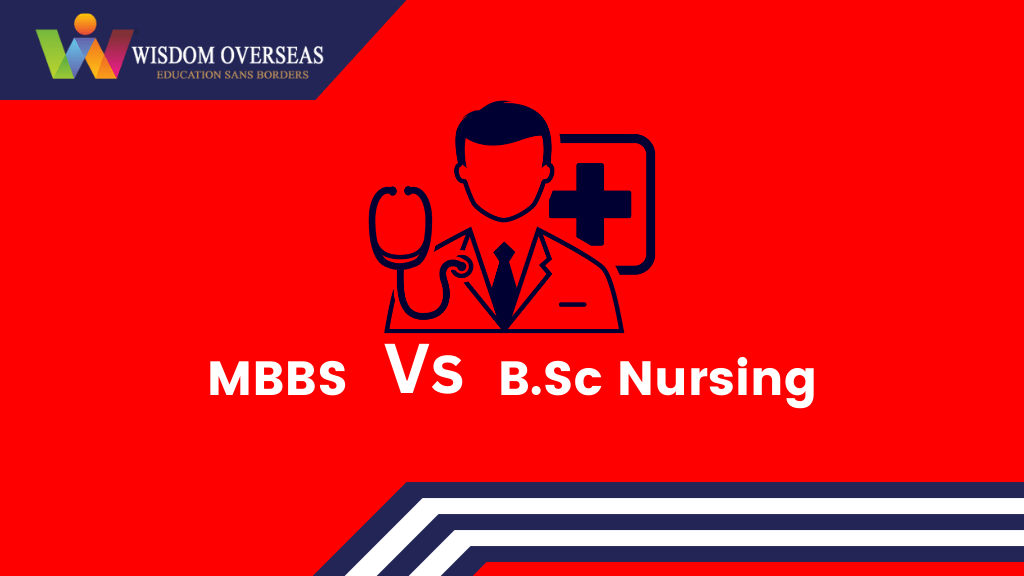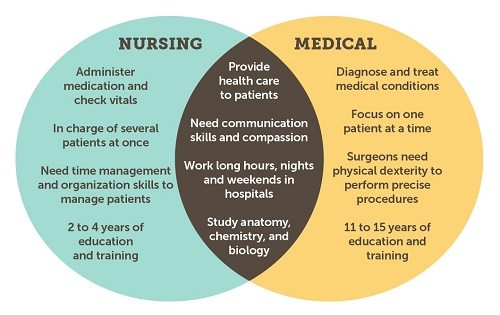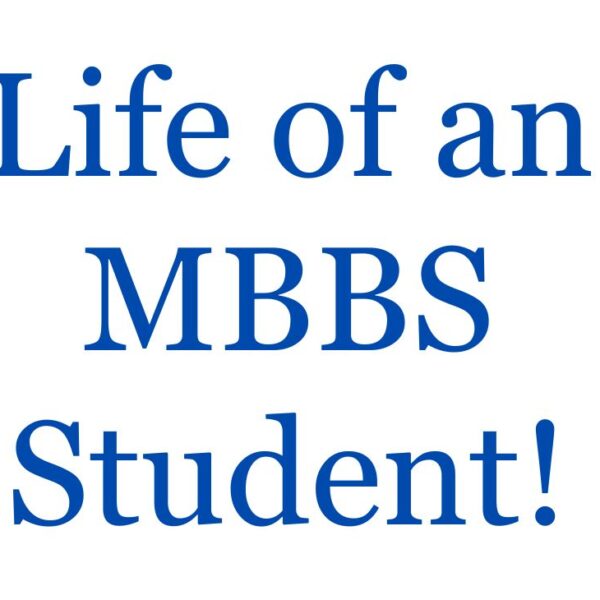
MBBS Vs B.Sc Nursing
MBBS and B.Sc Nursing are two different educational pathways that lead to careers in the healthcare sector. Here’s a comparison of MBBS and B.Sc Nursing:
MBBS (Bachelor of Medicine, Bachelor of Surgery):
- MBBS is an undergraduate degree that focuses on medical education and training to become a doctor or physician.
- The course duration is usually five to six years, depending on the country and the curriculum.
- Students learn various subjects such as anatomy, physiology, biochemistry, pharmacology, pathology, and clinical medicine.
- After completing MBBS, graduates can work as doctors in hospitals, clinics, or private practice, and they can specialize in different medical fields through postgraduate studies.
B.Sc Nursing (Bachelor of Science in Nursing):
- B.Sc Nursing is an undergraduate degree program that prepares students to become professional nurses.
- The course duration is typically four years, and it covers subjects like anatomy, nutrition, psychology, community health, and nursing practices.
- Students gain practical experience through clinical rotations in hospitals and other healthcare settings.
- After graduation, B.Sc Nursing graduates can work as registered nurses, providing care to patients, assisting doctors, and working in various healthcare settings.
MBBS Vs B.Sc Nursing: Eligibility Criteria
The admission requirements for MBBS and B.Sc Nursing in India might have some variations depending on the specific universities or institutions. However, I can provide you with some general information about the typical admission requirements for both programs:
MBBS:
Educational Qualifications: Candidates should have completed their 10+2 or equivalent examination with Physics, Chemistry, Biology, and English as core subjects. Most institutions require a minimum aggregate percentage (usually around 50% to 60%) in these subjects.
Entrance Exams: Aspiring MBBS students in India usually need to appear for national or state-level entrance exams like NEET (National Eligibility cum Entrance Test) to qualify for admission. NEET is a common entrance test for medical courses in India.
Age Limit: There is typically an upper age limit for MBBS admissions, which may vary depending on the category of the candidate (e.g., general, SC/ST, OBC, etc.).
Counseling: After clearing the entrance exam, candidates need to participate in counseling sessions conducted by respective authorities to secure admission to specific medical colleges.
B.Sc Nursing:
Educational Qualifications: Candidates must have completed their 10+2 or equivalent examination with Physics, Chemistry, Biology, and English as core subjects. Some institutions might also consider students from the Arts stream with Biology as an additional subject.
Entrance Exams: Different states or institutions may conduct their entrance exams for B.Sc Nursing admissions. In some cases, universities may admit students based on their 10+2 board exam marks.
Age Limit: There is usually an upper age limit for B.Sc Nursing admissions, which may vary from one institute to another.
Counseling: After clearing the entrance exam or meeting the required criteria, candidates need to participate in counseling sessions conducted by respective nursing colleges or state authorities to secure admission.
Please note that the admission requirements and processes might have changed since my last update, so it is essential to check with specific universities or state authorities for the most up-to-date information on admission requirements for MBBS and B.Sc Nursing programs in India.
B.SC Nursing Vs MBBS: Professions
MBBS and B.Sc Nursing lead to different professions in the healthcare sector. Here’s an overview of the professions associated with each degree.
MBBS
Profession: Medical Doctor or Physician
- After completing MBBS, graduates become medical doctors or physicians.
- They are qualified to diagnose and treat various medical conditions, prescribe medications, and perform medical procedures.
- Medical doctors work in hospitals, clinics, private practices, and other healthcare settings.
- They can specialize in specific medical fields through postgraduate studies (residency programs) such as cardiology, neurology, surgery, pediatrics, etc.
- As licensed doctors, they are responsible for the overall management of patients’ health and well-being.
B.Sc Nursing
Profession: Registered Nurse (RN)
- Graduates of B.Sc Nursing become registered nurses (RNs).
- Registered nurses provide direct patient care, administer medications, monitor patients’ conditions, and carry out medical treatments as prescribed by doctors.
- They work in hospitals, clinics, nursing homes, community health centers, schools, and other healthcare settings.
- RNs play a crucial role in patient care, assisting with patient mobility, and wound care, and providing emotional support to patients and their families.
- They work collaboratively with other healthcare professionals, including doctors, to implement treatment plans and ensure the overall well-being of patients.
Overall, MBBS graduates become medical doctors who have the authority to diagnose and treat medical conditions, while B.Sc Nursing graduates become registered nurses who provide direct patient care and support under the supervision of doctors. Both professions are vital in the healthcare system and work together as a team to deliver comprehensive and holistic healthcare services to patients.
MBBS Vs B.Sc Nursing
| Aspect | MBBS | B.Sc Nursing |
| Focus | Training individuals to become doctors, diagnosing and treating medical conditions, performing surgeries | Nursing care, patient management, assisting doctors in medical services |
| Course Duration | Longer (typically 5.5 years, including internship) | Shorter (typically 4 years) |
| Curriculum | Extensive medical knowledge, specialization through further education | Primary focus on nursing skills and patient care |
| Independence | Graduates can diagnose, prescribe medications, and perform medical procedures independently | Work in collaboration with doctors, providing care and support to patients |
| Role in Healthcare | Primary care providers and decision-makers in patient treatment | Supportive role, assisting in patient care under doctor’s guidance |
| Licensing and Authority | Eligible for medical licensure, authorized to practice as a doctor | Registered nurses with specific nursing licenses |
MBBS Vs B.Sc Nursing: Which One to Choose?
The choice between MBBS and B.Sc Nursing depends on your interests, career goals, and the type of healthcare profession you wish to pursue. Here are some factors to consider when making your decision:
Career Aspirations:
- If you aspire to become a medical doctor, diagnose and treat various medical conditions, and have the authority to perform surgeries, then MBBS is the right choice for you.
- On the other hand, if you have a passion for patient care, want to work closely with patients and their families, and provide hands-on nursing services, then B.Sc Nursing might be the better fit.
Duration of Study:
- MBBS is generally a longer program, typically taking five to six years to complete, depending on the country and the curriculum.
- B.Sc Nursing is usually a four-year undergraduate program.
Level of Responsibility:
- As a medical doctor with an MBBS degree, you will have more responsibility and autonomy in making medical decisions and managing patients’ health.
- Registered nurses with a B.Sc Nursing degree work under the supervision of doctors and play a vital role in assisting with patient care and providing support.
Specialization:
- MBBS allows for specialization in various medical fields through postgraduate studies (residency programs). If you want to specialize in a specific area of medicine, MBBS offers more opportunities for specialization.
- B.Sc Nursing graduates can pursue further studies and specialize in areas like nurse practitioner, nurse anesthesia, pediatric nursing, etc.
Work Environment:
- MBBS graduates work in hospitals, clinics, private practices, and other medical settings as medical doctors.
- B.Sc Nursing graduates work in hospitals, nursing homes, community health centers, schools, and other healthcare facilities as registered nurses.
Work-Life Balance:
- The work hours and demands may differ between medical doctors and registered nurses. Consider the work-life balance that each profession offers.
Passion for Science vs. Patient Care:
MBBS involves an in-depth study of medical sciences, while B.Sc Nursing focuses on patient care, interpersonal skills, and hands-on nursing practices. Choose the one that aligns more with your interests and strengths.
Both MBBS and B.Sc Nursing are honorable professions that contribute significantly to the healthcare field. Consider your passion, interests, and long-term career goals when making your decision. It may also be helpful to talk to professionals in both fields, shadow them if possible, and gather more information to make an informed choice that suits you best.






